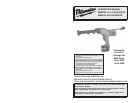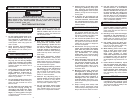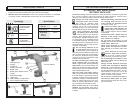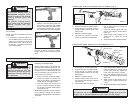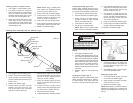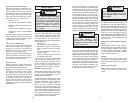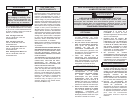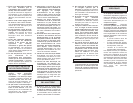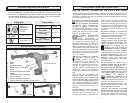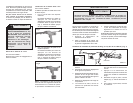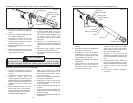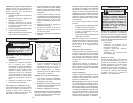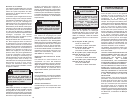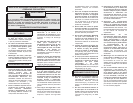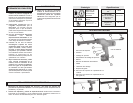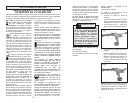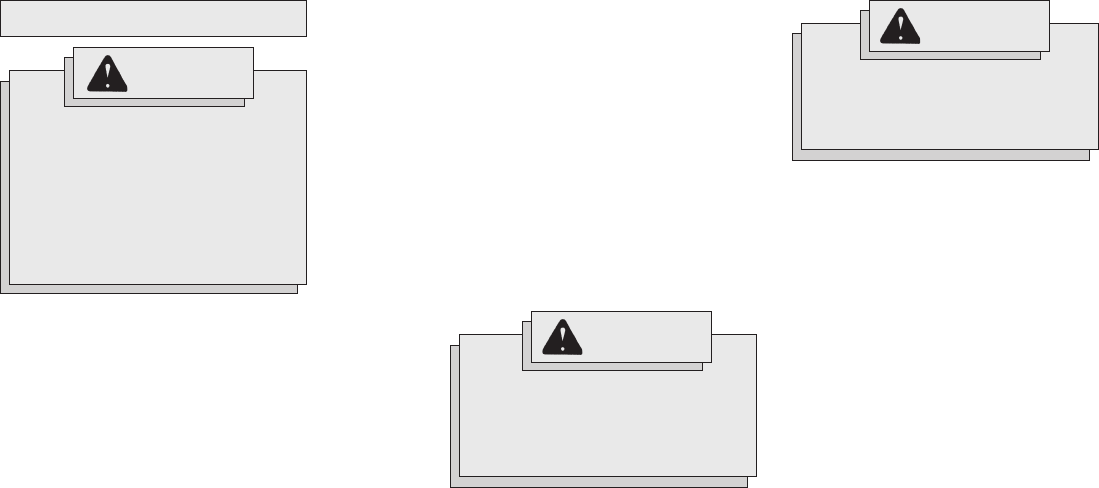
10 11
WARNING!
To reduce the risk of explosion,
never burn a battery pack even if
it is damaged, dead or completely
discharged.
MAINTENANCE
WARNING!
To reduce the risk of personal
injury, always unplug the charger
and remove the battery pack from
the charger or tool before per-
forming any maintenance. Never
disassemble the tool, battery
pack or charger. Contact a
MILWAUKEE service facility for
ALL repairs.
WARNING!
To reduce the risk of personal
injury and damage, never
immerse your tool, battery pack
or charger in liquid or allow a liquid
to flow inside them.
Maintaining Tool
Keep your tool, battery pack and charger
in good repair by adopting a regular main-
tenance program. After six months to one
year, depending on use, return the tool,
battery pack and charger to a MILWAUKEE
service facility for:
Lubrication
Brush inspection and replacement
Mechanical inspection and cleaning
(gears, spindles, bearings, housing,
etc.)
Electrical inspection (battery pack,
charger, motor)
Testing to assure proper mechanical
and electrical operation
If the tool does not start or operate at full
power with a fully charged battery pack,
clean the contacts on the battery pack. If
the tool still does not work properly, return
the tool, charger and battery pack to a
MILWAUKEE service facility for repairs.
Maintaining Battery Pack
MILWAUKEE battery packs will operate
for many years and/or hundreds of cycles
when they are maintained and used ac-
cording to these instructions.
A battery pack that is stored for six months
without being used will discharge itself.
Batteries discharge at a rate of about 1%
per day. Charge the battery every six
months even if it is unused to maximize
battery life. Do not tape the trigger in the
ON position and leave the tool unattended
as this may discharge the battery to a point
where it will no longer be able to recharge.
Use a MILWAUKEE battery pack only until
it no longer performs with the power and
torque needed for your application.
Store your battery pack in a cool, dry place.
Do not store it where the temperature may
exceed 120°F (50°C) such as in a vehicle
or metal building during the summer. High
temperatures will overheat the battery pack,
reducing battery life. If it is stored for sev-
eral months, the battery pack will gradu-
ally lose its charge. One to three cycles of
charging and discharging through normal
use will restore the capacity of the battery
pack. During the life of the battery pack,
the operating time between charges be-
comes shorter. If the operating time be-
comes extremely short after a proper
charge, the usable life of the battery pack
has been reached and it should be replaced.
Cleaning
Clean dust and debris from charger and
tool vents. Keep tool handles clean, dry and
free of oil or grease. Use only mild soap and
a damp cloth to clean the tool, battery pack
and charger since certain cleaning agents
and solvents are harmful to plastics and
other insulated parts. Some of these in-
clude gasoline, turpentine, lacquer thinner,
paint thinner, chlorinated cleaning solvents,
ammonia and household detergents con-
taining ammonia. Never use flammable or
combustible solvents around tools.
Electronic Overload Protection
The gun is protected by an electronic over-
load protection feature. If too much pres-
sure is exerted on the tube, the motor will
automatically reverse for one second, and
then shut down. This helps to prevent dam-
age to the tool and the caulk tube or pack.
If the motor shuts off, make sure that:
Nozzle tip is cut
Inner seal in the caulk tube is broken
Hardened material is removed from the
nozzle
Caulk tube is not damaged or frozen
Plunger rod is free of caulk/adhesive
materials
Release trigger to allow the electronics to
reset. If the motor continues to shut off, try
another tube of material or take the tool to
a MILWAUKEE Service Center.
Auto-Reverse Mechanism
This tool has an auto-reverse feature that
reverses the plunger when the trigger is
pressed for more than 2 seconds and
released. This feature helps stop excess
material from continuing to flow.
Pulsing the trigger will deactivate the auto-
reverse mechanism and allow for contin-
ued pressure on the tube. This helps main-
tain a slower material feed rate.
Auto-Shut Off
When a caulk tube is empty, the auto-shut
off feature will turn the motor off. Pull the
plunger back and replace the tube.
Caution: Unexplained tool shut-off or
auto-reverse may be due to caulk or adhe-
sive material on the plunger rod. Plunger
rod must remain clean and free of all caulk
and adhesive material. If material does get
on plunger rod mechanism, remove the
plunger rod and clean the material off of
the rod and tool with a brush and solvent
according to the caulk or adhesive material's
manufacturer.
RBRC Battery Recycling Seals
The RBRC Battery Recycling Seals (see
"Symbology") on your tool battery packs in-
dicate that MILWAUKEE has arranged for
the recycling of that battery pack with the
Rechargeable Battery Recycling Corporation
(RBRC). At the end of your battery pack's
useful life, return the battery pack to a
MILWAUKEE Branch Office/Service Center
or the participating retailer nearest you. For
more information, visit the RBRC web site at
www.rbrc.org.
Disposing of Nickel-Cadmium Battery
Packs
Nickel-Cadmium battery packs are recy-
clable. Under various state and local laws,
it may be illegal to dispose of this battery
into the municipal waste stream. Dispose
of your battery pack according to federal,
state and local regulations.
Repairs
For repairs, return the tool, battery pack
and charger to the nearest service center
listed on the back cover of this operator's
manual.
Battery Pack Warranty
Battery packs for cordless tools are war-
ranted for one year from the date of pur-
chase.



